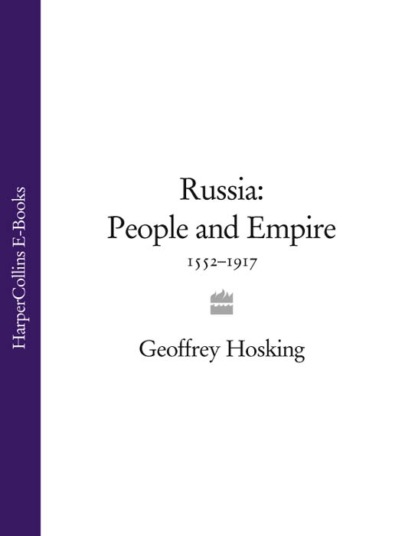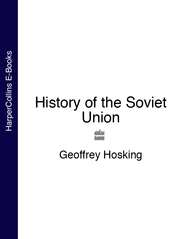По всем вопросам обращайтесь на: info@litportal.ru
(©) 2003-2024.
✖
Russia: People and Empire: 1552–1917
Настройки чтения
Размер шрифта
Высота строк
Поля
Russia: People and Empire: 1552–1917
Geoffrey Hosking
‘It is unlikely that a clearer, more stimulating account of the Russians’ extraordinary period of imperial history will be written.’ Philip Marsden, SpectatorGeoffrey Hosking’s landmark book provides us with a new prism through which to view Russian history by posing the apparently simple question: what is Russia’s national identity?Hosking answers this with brilliant originality: his thesis is that the needs of Russia’s empire prevented the creation of a Russian nation. The Tsars, and before them the Grand Dukes of Moscow, were empire builders rather than nation builders and, as consequence, profoundly alienated ordinary Russians.
GEOFFREY HOSKING
RUSSIA
PEOPLE AND EMPIRE
1552–1917
Contents
Cover (#u81a7607b-0ceb-5e93-b403-14d44175f013)
Title Page (#u755892da-8697-5782-97d3-802f3c68c083)
Introduction (#u48b4a497-c216-56b9-93b0-065397e7e90f)
PART ONE The Russian Empire: How and Why? (#u165b9fc5-138c-53e6-a5d2-0deb553d382e)
PART TWO State-building (#uafe0f149-3d58-5c6e-9346-efd75502cc30)
1 The First Crises of empire (#u479fc969-a82b-540f-b076-1cf7e4cd43e2)
2 The Secular State of Peter the Great (#u8e17ada7-849e-5f2d-b747-134c29eb0f0e)
3 Assimilating Peter’s Heritage (#ud4be04ba-bc9d-53fc-b503-305d5370596c)
4 The Apogee of the Secular State (#ucffb1f36-cad9-582b-bcc8-9efc6ab9314a)
PART THREE Social classes, religion and culture in Imperial Russia (#litres_trial_promo)
1 The Nobility (#litres_trial_promo)
2 The Army (#litres_trial_promo)
3 The Peasantry (#litres_trial_promo)
4 The Orthodox Church (#litres_trial_promo)
5 Towns and the Missing Bourgeoisie (#litres_trial_promo)
6 The Birth of the Intelligentsia (#litres_trial_promo)
7 Literature as ‘Nation-Builder’ (#litres_trial_promo)
PART FOUR Imperial Russia under pressure (#litres_trial_promo)
1 The Reforms of Alexander II (#litres_trial_promo)
2 Russian Socialism (#litres_trial_promo)
3 Russification (#litres_trial_promo)
4 The Revolution of 1905–7 (#litres_trial_promo)
5 The Duma Monarchy (#litres_trial_promo)
6 The Revolution of 1917 (#litres_trial_promo)
Conclusions (#litres_trial_promo)
Afterthoughts on the Soviet Experience (#litres_trial_promo)
Chronology (#litres_trial_promo)
Notes (#litres_trial_promo)
Index (#litres_trial_promo)
Acknowledgements (#litres_trial_promo)
About the Author (#litres_trial_promo)
ALSO BY GEOFFREY HOSKING (#litres_trial_promo)
RUSSIA PEOPLE AND EMPIRE (#litres_trial_promo)
MAPS (#ud69b7fc5-6c26-5f40-9d84-dc9a19c3d0e9)
Copyright (#litres_trial_promo)
About the Publisher (#litres_trial_promo)
MAPS (#ulink_fe1a126a-5a45-5092-8b64-9662d19219cd)
Introduction (#ulink_b55a5459-b34e-5c2e-a07c-b75dcc27bdbc)
Rus’ was the victim of Rossiia Georgii Gachev
If this book were in Russian, the title would contain two distinct epithets: russkii for the people and rossiiskii for the empire. The first derives from Ras’, the word customarily employed to denote the Kievan state and the Muscovite one in its early years. The second comes from Rossiia, a Latinized version probably first used in Poland, which penetrated to Muscovy in the sixteenth century and became common currency in the seventeenth – precisely during the time when the empire was being founded and extended.
(#litres_trial_promo)
In that way the Russian language reflects the fact that there are two kinds of Russianness, one connected with the people, the language and the pre-imperial principalities, the other with the territory, the multi-national empire, the European great power. Usage is not absolutely consistent, but any Russian will acknowledge that there is a considerable difference in tonality and association between the two words. Rus’ is humble, homely, sacred and definitely feminine (the poet Alexander Blok called her ‘my wife’); Rossiia grandiose, cosmopolitan, secular and, pace grammarians, masculine. The culturologist Georgii Gachev has dramatized the distinction: ‘Rossiia is the fate of Rus’. Rossiia is attraction, ideal and service – but also abyss and perdition. Rossiia uprooted the Russian people, enticed them away from Rus’, transformed the peasant into a soldier, an organiser, a boss, but no longer a husbandman.’
(#litres_trial_promo)
Geoffrey Hosking
‘It is unlikely that a clearer, more stimulating account of the Russians’ extraordinary period of imperial history will be written.’ Philip Marsden, SpectatorGeoffrey Hosking’s landmark book provides us with a new prism through which to view Russian history by posing the apparently simple question: what is Russia’s national identity?Hosking answers this with brilliant originality: his thesis is that the needs of Russia’s empire prevented the creation of a Russian nation. The Tsars, and before them the Grand Dukes of Moscow, were empire builders rather than nation builders and, as consequence, profoundly alienated ordinary Russians.
GEOFFREY HOSKING
RUSSIA
PEOPLE AND EMPIRE
1552–1917
Contents
Cover (#u81a7607b-0ceb-5e93-b403-14d44175f013)
Title Page (#u755892da-8697-5782-97d3-802f3c68c083)
Introduction (#u48b4a497-c216-56b9-93b0-065397e7e90f)
PART ONE The Russian Empire: How and Why? (#u165b9fc5-138c-53e6-a5d2-0deb553d382e)
PART TWO State-building (#uafe0f149-3d58-5c6e-9346-efd75502cc30)
1 The First Crises of empire (#u479fc969-a82b-540f-b076-1cf7e4cd43e2)
2 The Secular State of Peter the Great (#u8e17ada7-849e-5f2d-b747-134c29eb0f0e)
3 Assimilating Peter’s Heritage (#ud4be04ba-bc9d-53fc-b503-305d5370596c)
4 The Apogee of the Secular State (#ucffb1f36-cad9-582b-bcc8-9efc6ab9314a)
PART THREE Social classes, religion and culture in Imperial Russia (#litres_trial_promo)
1 The Nobility (#litres_trial_promo)
2 The Army (#litres_trial_promo)
3 The Peasantry (#litres_trial_promo)
4 The Orthodox Church (#litres_trial_promo)
5 Towns and the Missing Bourgeoisie (#litres_trial_promo)
6 The Birth of the Intelligentsia (#litres_trial_promo)
7 Literature as ‘Nation-Builder’ (#litres_trial_promo)
PART FOUR Imperial Russia under pressure (#litres_trial_promo)
1 The Reforms of Alexander II (#litres_trial_promo)
2 Russian Socialism (#litres_trial_promo)
3 Russification (#litres_trial_promo)
4 The Revolution of 1905–7 (#litres_trial_promo)
5 The Duma Monarchy (#litres_trial_promo)
6 The Revolution of 1917 (#litres_trial_promo)
Conclusions (#litres_trial_promo)
Afterthoughts on the Soviet Experience (#litres_trial_promo)
Chronology (#litres_trial_promo)
Notes (#litres_trial_promo)
Index (#litres_trial_promo)
Acknowledgements (#litres_trial_promo)
About the Author (#litres_trial_promo)
ALSO BY GEOFFREY HOSKING (#litres_trial_promo)
RUSSIA PEOPLE AND EMPIRE (#litres_trial_promo)
MAPS (#ud69b7fc5-6c26-5f40-9d84-dc9a19c3d0e9)
Copyright (#litres_trial_promo)
About the Publisher (#litres_trial_promo)
MAPS (#ulink_fe1a126a-5a45-5092-8b64-9662d19219cd)
Introduction (#ulink_b55a5459-b34e-5c2e-a07c-b75dcc27bdbc)
Rus’ was the victim of Rossiia Georgii Gachev
If this book were in Russian, the title would contain two distinct epithets: russkii for the people and rossiiskii for the empire. The first derives from Ras’, the word customarily employed to denote the Kievan state and the Muscovite one in its early years. The second comes from Rossiia, a Latinized version probably first used in Poland, which penetrated to Muscovy in the sixteenth century and became common currency in the seventeenth – precisely during the time when the empire was being founded and extended.
(#litres_trial_promo)
In that way the Russian language reflects the fact that there are two kinds of Russianness, one connected with the people, the language and the pre-imperial principalities, the other with the territory, the multi-national empire, the European great power. Usage is not absolutely consistent, but any Russian will acknowledge that there is a considerable difference in tonality and association between the two words. Rus’ is humble, homely, sacred and definitely feminine (the poet Alexander Blok called her ‘my wife’); Rossiia grandiose, cosmopolitan, secular and, pace grammarians, masculine. The culturologist Georgii Gachev has dramatized the distinction: ‘Rossiia is the fate of Rus’. Rossiia is attraction, ideal and service – but also abyss and perdition. Rossiia uprooted the Russian people, enticed them away from Rus’, transformed the peasant into a soldier, an organiser, a boss, but no longer a husbandman.’
(#litres_trial_promo)






